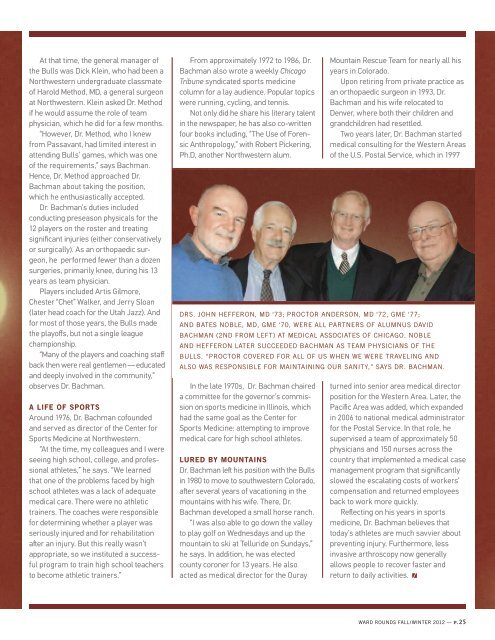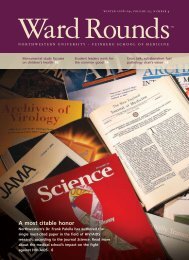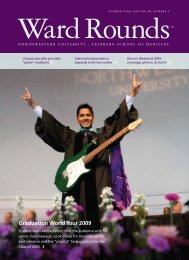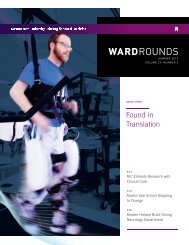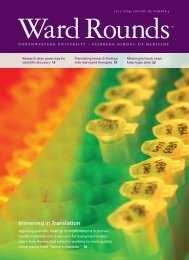Download PDF - Ward Rounds - Northwestern University
Download PDF - Ward Rounds - Northwestern University
Download PDF - Ward Rounds - Northwestern University
You also want an ePaper? Increase the reach of your titles
YUMPU automatically turns print PDFs into web optimized ePapers that Google loves.
At that time, the general manager of<br />
the Bulls was Dick Klein, who had been a<br />
<strong>Northwestern</strong> undergraduate classmate<br />
of Harold Method, MD, a general surgeon<br />
at <strong>Northwestern</strong>. Klein asked Dr. Method<br />
if he would assume the role of team<br />
physician, which he did for a few months.<br />
“However, Dr. Method, who I knew<br />
from Passavant, had limited interest in<br />
attending Bulls’ games, which was one<br />
of the requirements,” says Bachman.<br />
Hence, Dr. Method approached Dr.<br />
Bachman about taking the position,<br />
which he enthusiastically accepted.<br />
Dr. Bachman’s duties included<br />
conducting preseason physicals for the<br />
12 players on the roster and treating<br />
significant injuries (either conservatively<br />
or surgically). As an orthopaedic surgeon,<br />
he performed fewer than a dozen<br />
surgeries, primarily knee, during his 13<br />
years as team physician.<br />
Players included Artis Gilmore,<br />
Chester “Chet” Walker, and Jerry Sloan<br />
(later head coach for the Utah Jazz). And<br />
for most of those years, the Bulls made<br />
the playoffs, but not a single league<br />
championship.<br />
“Many of the players and coaching staff<br />
back then were real gentlemen — educated<br />
and deeply involved in the community,”<br />
observes Dr. Bachman.<br />
A life of sports<br />
Around 1976, Dr. Bachman cofounded<br />
and served as director of the Center for<br />
Sports Medicine at <strong>Northwestern</strong>.<br />
“At the time, my colleagues and I were<br />
seeing high school, college, and professional<br />
athletes,” he says. “We learned<br />
that one of the problems faced by high<br />
school athletes was a lack of adequate<br />
medical care. There were no athletic<br />
trainers. The coaches were responsible<br />
for determining whether a player was<br />
seriously injured and for rehabilitation<br />
after an injury. But this really wasn’t<br />
appropriate, so we instituted a successful<br />
program to train high school teachers<br />
to become athletic trainers.”<br />
From approximately 1972 to 1986, Dr.<br />
Bachman also wrote a weekly Chicago<br />
Tribune syndicated sports medicine<br />
column for a lay audience. Popular topics<br />
were running, cycling, and tennis.<br />
Not only did he share his literary talent<br />
in the newspaper, he has also co-written<br />
four books including, “The Use of Forensic<br />
Anthropology,” with Robert Pickering,<br />
Ph.D, another <strong>Northwestern</strong> alum.<br />
In the late 1970s, Dr. Bachman chaired<br />
a committee for the governor’s commission<br />
on sports medicine in Illinois, which<br />
had the same goal as the Center for<br />
Sports Medicine: attempting to improve<br />
medical care for high school athletes.<br />
Lured by mountains<br />
Dr. Bachman left his position with the Bulls<br />
in 1980 to move to southwestern Colorado,<br />
after several years of vacationing in the<br />
mountains with his wife. There, Dr.<br />
Bachman developed a small horse ranch.<br />
“I was also able to go down the valley<br />
to play golf on Wednesdays and up the<br />
mountain to ski at Telluride on Sundays,”<br />
he says. In addition, he was elected<br />
county coroner for 13 years. He also<br />
acted as medical director for the Ouray<br />
Mountain Rescue Team for nearly all his<br />
years in Colorado.<br />
Upon retiring from private practice as<br />
an orthopaedic surgeon in 1993, Dr.<br />
Bachman and his wife relocated to<br />
Denver, where both their children and<br />
grandchildren had resettled.<br />
Two years later, Dr. Bachman started<br />
medical consulting for the Western Areas<br />
of the U.S. Postal Service, which in 1997<br />
Drs. John Hefferon, MD ‘73; Proctor Anderson, MD ‘72, GME ‘77;<br />
and Bates Noble, MD, GME ‘70, were all partners of alumnus David<br />
Bachman (2nd from left) AT MEDICAL ASSOCIATES OF CHICAGO. Noble<br />
and Hefferon later succeeded Bachman as team physicians of the<br />
Bulls. “Proctor covered for all of us when we were traveling and<br />
also was responsible for maintaining our sanity,” says Dr. Bachman.<br />
turned into senior area medical director<br />
position for the Western Area. Later, the<br />
Pacific Area was added, which expanded<br />
in 2006 to national medical administrator<br />
for the Postal Service. In that role, he<br />
supervised a team of approximately 50<br />
physicians and 150 nurses across the<br />
country that implemented a medical case<br />
management program that significantly<br />
slowed the escalating costs of workers’<br />
compensation and returned employees<br />
back to work more quickly.<br />
Reflecting on his years in sports<br />
medicine, Dr. Bachman believes that<br />
today’s athletes are much savvier about<br />
preventing injury. Furthermore, less<br />
invasive arthroscopy now generally<br />
allows people to recover faster and<br />
return to daily activities.<br />
ward rounds Fall/Winter 2012 — p.25


